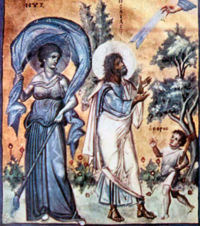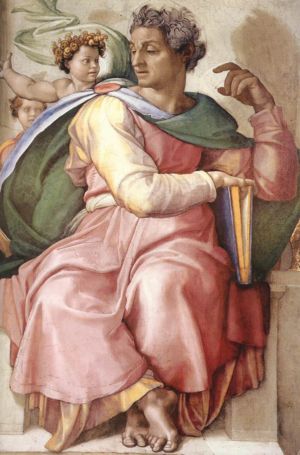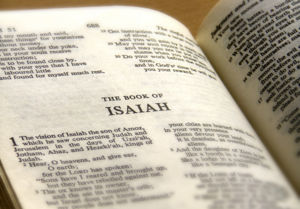Difference between revisions of "Isaiah"
m (→Empires during his life: spelling) |
(updates from Catholic Encyclopedia) |
||
| (2 intermediate revisions by the same user not shown) | |||
| Line 1: | Line 1: | ||
[[Image:Isaiah-Michelangelo.jpg|thumb|right|300px|Isaiah the Prophet in Hebrew Scriptures was depicted on the [[Sistine Chapel]] ceiling by [[Michelangelo]].]] | [[Image:Isaiah-Michelangelo.jpg|thumb|right|300px|Isaiah the Prophet in Hebrew Scriptures was depicted on the [[Sistine Chapel]] ceiling by [[Michelangelo]].]] | ||
| − | '''Isaiah''' or '''Yeshayáhu''' ('''יְשַׁעְיָהוּ''' "Salvation of/is [[Tetragrammaton|the Lord]]", [[Standard Hebrew]] was the son of [[Amoz]], and commonly considered the author of the [[Book of Isaiah]]. | + | '''Isaiah''' or '''Yeshayáhu''' ('''יְשַׁעְיָהוּ''' "Salvation of/is [[Tetragrammaton|the Lord]]", [[Standard Hebrew]] was the son of [[Amoz]], and commonly considered the author of the [[Book of Isaiah]]. Other translations of his name include ''Isaias'' meaning "Yahweh is salvation". |
==Biography== | ==Biography== | ||
| + | There is a Jewish tradition recorded in the Talmud (Tr. Megilla, 10b.) which indicates he was a nephew of King Amasias or [[Uzziah]]. It is not known exactly when he was born, but he is believed to have been about twenty years of age when he began his public ministry, which lasted approximately 50 years. He was a citizen of Jerusalem, perhaps a native, of Jerusalem. His writings give unmistakable signs of high culture, and due to his easy access to royalty, it is assumed he was of royal lineage. | ||
| + | |||
Isaiah was married to a woman referred to as "the prophetess" (8:3). Why she is called this is disputed. Some believe she may have carried out a prophetic ministry in her own right, like [[Deborah]] ([[Judges]] 4:4) and [[Huldah]] ([[2 Kings]] 22:14-20). Others maintain, however, that it was simply because she was the wife of "the prophet" (Isa. 38:1),and not because she was herself endowed with the prophetic gift. Isaiah had by her two sons, who bore symbolic names (Isa. 8:18) - [[Shear-jashub]], 'Remnant will return' or '[Only] a remnant will return' (7:3) and [[Maher-shalal-hash-baz]], 'To speed the spoil he hasteneth the prey' or, 'Destruction is imminent'(8:1-4). | Isaiah was married to a woman referred to as "the prophetess" (8:3). Why she is called this is disputed. Some believe she may have carried out a prophetic ministry in her own right, like [[Deborah]] ([[Judges]] 4:4) and [[Huldah]] ([[2 Kings]] 22:14-20). Others maintain, however, that it was simply because she was the wife of "the prophet" (Isa. 38:1),and not because she was herself endowed with the prophetic gift. Isaiah had by her two sons, who bore symbolic names (Isa. 8:18) - [[Shear-jashub]], 'Remnant will return' or '[Only] a remnant will return' (7:3) and [[Maher-shalal-hash-baz]], 'To speed the spoil he hasteneth the prey' or, 'Destruction is imminent'(8:1-4). | ||
| Line 11: | Line 13: | ||
==Empires during his life== | ==Empires during his life== | ||
| − | In early youth Isaiah must have been moved by the invasion of [[Kingdom of Israel]] by the [[Assyria]]n monarch [[Tiglath-Pilasser III]] (2 Kings 15:19); and again, twenty years later, when he had already entered on his office, by the invasion of [[Tiglath-Pilasser III]] and his career of conquest. [[Ahaz]], king of Judah, at this crisis refused to co-operate with the kings of [[Kingdom of Israel]] and [[Syria]] in opposition to the Assyrians, and was on that account attacked and defeated by Rezin of [[Damascus]] and [[Pekah]] of Israel (2 Kings 16:5; [[Books of Chronicles|2 Chronicles]] 28:5, 6). Ahaz, thus humbled, sided with Assyria, and sought the aid of [[Tiglath- | + | In early youth Isaiah must have been moved by the invasion of [[Kingdom of Israel]] by the [[Assyria]]n monarch [[Tiglath-Pilasser III]] (2 Kings 15:19); and again, twenty years later, when he had already entered on his office, by the invasion of [[Tiglath-Pilasser III]] and his career of conquest. [[Ahaz]], king of Judah, at this crisis refused to co-operate with the kings of [[Kingdom of Israel]] and [[Syria]] in opposition to the Assyrians, and was on that account attacked and defeated by Rezin of [[Damascus]] and [[Pekah]] of Israel (2 Kings 16:5; [[Books of Chronicles|2 Chronicles]] 28:5, 6). Ahaz, thus humbled, sided with Assyria, and sought the aid of [[Tiglath-Pilasser III|Tiglath-Pileser]] against Israel and Syria. The consequence was that Rezin and Pekah were conquered and many of the people carried captive to Assyria (2 Kings 15:29; 16:9; [[Books of Chronicles|1 Chronicles]] 5:26). |
Soon after this [[Shalmaneser V]] determined wholly to subdue the kingdom of Israel, [[Samaria]] was taken and destroyed ([[720s BC|722 BC]]). So long as Ahaz reigned, the kingdom of Judah was unmolested by the Assyrian power; but on his accession to the throne, Hezekiah, who was encouraged by Isaiah to rebel "against the king of Assyria" (2 Kings 18:7), entered into an alliance with the king of [[Egypt]] (Isa. 30:2-4). This led the king of Assyria to threaten the king of Judah, and at length to invade the land. [[Sennacherib]] ([[700s BC|701 BC]]) led a powerful army into Judah. Hezekiah was reduced to despair, and submitted to the Assyrians (2 Kings 18:14-16). But after a brief interval war broke out again, and again Sennacherib led an army into Judah, one detachment of which threatened Jerusalem (Isa. 36:2-22; 37:8). Isaiah on that occasion encouraged Hezekiah to resist the Assyrians (37:1-7), whereupon Sennacherib sent a threatening letter to Hezekiah, which he "spread before the Lord" (37:14). According to the account in Kings (and its derivative account in Chronicles) the judgement of God now fell on the Assyrian army. "Like [[Xerxes I|Xerxes]] in Greece, Sennacherib never recovered from the shock of the disaster in Judah. He made no more expeditions against either southern Palestine or Egypt." | Soon after this [[Shalmaneser V]] determined wholly to subdue the kingdom of Israel, [[Samaria]] was taken and destroyed ([[720s BC|722 BC]]). So long as Ahaz reigned, the kingdom of Judah was unmolested by the Assyrian power; but on his accession to the throne, Hezekiah, who was encouraged by Isaiah to rebel "against the king of Assyria" (2 Kings 18:7), entered into an alliance with the king of [[Egypt]] (Isa. 30:2-4). This led the king of Assyria to threaten the king of Judah, and at length to invade the land. [[Sennacherib]] ([[700s BC|701 BC]]) led a powerful army into Judah. Hezekiah was reduced to despair, and submitted to the Assyrians (2 Kings 18:14-16). But after a brief interval war broke out again, and again Sennacherib led an army into Judah, one detachment of which threatened Jerusalem (Isa. 36:2-22; 37:8). Isaiah on that occasion encouraged Hezekiah to resist the Assyrians (37:1-7), whereupon Sennacherib sent a threatening letter to Hezekiah, which he "spread before the Lord" (37:14). According to the account in Kings (and its derivative account in Chronicles) the judgement of God now fell on the Assyrian army. "Like [[Xerxes I|Xerxes]] in Greece, Sennacherib never recovered from the shock of the disaster in Judah. He made no more expeditions against either southern Palestine or Egypt." | ||
| Line 20: | Line 22: | ||
==Traditions concerning Isaiah's death== | ==Traditions concerning Isaiah's death== | ||
| − | There is a tradition that he suffered martyrdom in the pagan reaction in the time of Manasseh. Both [[Jewish]] and [[Christian]] traditions state that he was killed by being sawed in half. Some interpreters believe that this is what is referred to by [[Epistle to the Hebrews|Hebrews]] 11:37 (in the [[New Testament]]), which states that some prophets were "sawn in two". It is also mentioned in the book of The Martyrdom of Isaiah that he lived into the days of Manasseh, and was also sawn in half with a wooden saw. | + | There is a tradition that he suffered martyrdom in the pagan reaction in the time of Manasseh. Both [[Jewish]] and [[Christian]] traditions state that he was killed by being sawed in half. Some interpreters believe that this is what is referred to by [[Epistle to the Hebrews|Hebrews]] 11:37 (in the [[New Testament]]), which states that some prophets were "sawn in two". It is also mentioned in the book of The Martyrdom of Isaiah that he lived into the days of Manasseh, and was also sawn in half with a wooden saw. |
| + | |||
| + | According to this tradition [[King Manasseh]] had convicted Isaiah of blasphemy for saying he "had seen God upon his throne." Isaiah was also accused of comparing Jerusalem to [[Sodom and Gomorrah]]. Manasseh therefore trapped him against a large tree. Isaiah was tied to the tree, and the tree as well as the prophet were sawn in half. | ||
| + | |||
| + | The Roman Martyrology commemorates Isaias on 6 July. Isaiah's tomb is believed to have been in Paneas in Northern Palestine, and his relics were taken to Constantinople in A.D. 442. | ||
[[Image:Paris psalter.jpg|thumb|left|200px|''Prophet Isaiah Praying at Night'' (10th-century Byzantine miniature from the [[Paris Psalter]]).]] | [[Image:Paris psalter.jpg|thumb|left|200px|''Prophet Isaiah Praying at Night'' (10th-century Byzantine miniature from the [[Paris Psalter]]).]] | ||
| Line 34: | Line 40: | ||
{{eastons}} | {{eastons}} | ||
| − | [[Category: | + | ==References== |
| + | *'''Prophets'''. A&E Home video. Chapter 4. 1994. ISBN: 0-7670-8501-9. | ||
| + | |||
| + | [[Category:Prophets]] | ||
| + | [[Category:Old Testament]] | ||
Latest revision as of 21:02, 1 October 2006
Isaiah or Yeshayáhu (יְשַׁעְיָהוּ "Salvation of/is the Lord", Standard Hebrew was the son of Amoz, and commonly considered the author of the Book of Isaiah. Other translations of his name include Isaias meaning "Yahweh is salvation".
Contents
Biography
There is a Jewish tradition recorded in the Talmud (Tr. Megilla, 10b.) which indicates he was a nephew of King Amasias or Uzziah. It is not known exactly when he was born, but he is believed to have been about twenty years of age when he began his public ministry, which lasted approximately 50 years. He was a citizen of Jerusalem, perhaps a native, of Jerusalem. His writings give unmistakable signs of high culture, and due to his easy access to royalty, it is assumed he was of royal lineage.
Isaiah was married to a woman referred to as "the prophetess" (8:3). Why she is called this is disputed. Some believe she may have carried out a prophetic ministry in her own right, like Deborah (Judges 4:4) and Huldah (2 Kings 22:14-20). Others maintain, however, that it was simply because she was the wife of "the prophet" (Isa. 38:1),and not because she was herself endowed with the prophetic gift. Isaiah had by her two sons, who bore symbolic names (Isa. 8:18) - Shear-jashub, 'Remnant will return' or '[Only] a remnant will return' (7:3) and Maher-shalal-hash-baz, 'To speed the spoil he hasteneth the prey' or, 'Destruction is imminent'(8:1-4).
He exercised the functions of his office during the reigns of Uzziah (or Azariah), Jotham, Ahaz, and Hezekiah (1:1), the kings of Kingdom of Judah. Uzziah reigned fifty-two years in the middle of the 8th century BC, and Isaiah must have begun his career a few years before Uzziah's death, probably in the 740s BC. He lived till the fourteenth year of Hezekiah, and in all likelihood outlived that monarch (who died 698 BC), and may have been contemporary for some years with Manasseh. Thus Isaiah may have prophesied for the long period of at least sixty-four years.
His first call to the prophetical office is not recorded. A second call came to him "in the year that King Uzziah died" (Isa. 6:1). He exercised his ministry in a spirit of uncompromising firmness and boldness in regard to all that bore on the interests of religion. He conceals nothing and keeps nothing back from fear of man. He was also noted for his spirituality and for his deep-toned reverence toward "the holy One of Israel," whom Christians generally believe was the Messiah as quoted in passages of Handel's famous oratorio by that name. Isaiah and Micah were contemporaries (see Isa. 1:1 and Micah 1:1). They concentrated their prophecies mainly on Judah and Jerusalem (Isa. 1:1). Amos and Hosea preceded Isaiah (Amos 1:1; Hosea 1:1) and they prophesied mainly against the Northern tribes of Israel.
Empires during his life
In early youth Isaiah must have been moved by the invasion of Kingdom of Israel by the Assyrian monarch Tiglath-Pilasser III (2 Kings 15:19); and again, twenty years later, when he had already entered on his office, by the invasion of Tiglath-Pilasser III and his career of conquest. Ahaz, king of Judah, at this crisis refused to co-operate with the kings of Kingdom of Israel and Syria in opposition to the Assyrians, and was on that account attacked and defeated by Rezin of Damascus and Pekah of Israel (2 Kings 16:5; 2 Chronicles 28:5, 6). Ahaz, thus humbled, sided with Assyria, and sought the aid of Tiglath-Pileser against Israel and Syria. The consequence was that Rezin and Pekah were conquered and many of the people carried captive to Assyria (2 Kings 15:29; 16:9; 1 Chronicles 5:26).
Soon after this Shalmaneser V determined wholly to subdue the kingdom of Israel, Samaria was taken and destroyed (722 BC). So long as Ahaz reigned, the kingdom of Judah was unmolested by the Assyrian power; but on his accession to the throne, Hezekiah, who was encouraged by Isaiah to rebel "against the king of Assyria" (2 Kings 18:7), entered into an alliance with the king of Egypt (Isa. 30:2-4). This led the king of Assyria to threaten the king of Judah, and at length to invade the land. Sennacherib (701 BC) led a powerful army into Judah. Hezekiah was reduced to despair, and submitted to the Assyrians (2 Kings 18:14-16). But after a brief interval war broke out again, and again Sennacherib led an army into Judah, one detachment of which threatened Jerusalem (Isa. 36:2-22; 37:8). Isaiah on that occasion encouraged Hezekiah to resist the Assyrians (37:1-7), whereupon Sennacherib sent a threatening letter to Hezekiah, which he "spread before the Lord" (37:14). According to the account in Kings (and its derivative account in Chronicles) the judgement of God now fell on the Assyrian army. "Like Xerxes in Greece, Sennacherib never recovered from the shock of the disaster in Judah. He made no more expeditions against either southern Palestine or Egypt."
The remaining years of Hezekiah's reign were peaceful (2 Chr. 32:23, 27-29). Isaiah probably lived to its close, and possibly into the reign of Manasseh, but the time and manner of his death are not specified in either the Bible or recorded history.
Traditions concerning Isaiah's death
There is a tradition that he suffered martyrdom in the pagan reaction in the time of Manasseh. Both Jewish and Christian traditions state that he was killed by being sawed in half. Some interpreters believe that this is what is referred to by Hebrews 11:37 (in the New Testament), which states that some prophets were "sawn in two". It is also mentioned in the book of The Martyrdom of Isaiah that he lived into the days of Manasseh, and was also sawn in half with a wooden saw.
According to this tradition King Manasseh had convicted Isaiah of blasphemy for saying he "had seen God upon his throne." Isaiah was also accused of comparing Jerusalem to Sodom and Gomorrah. Manasseh therefore trapped him against a large tree. Isaiah was tied to the tree, and the tree as well as the prophet were sawn in half.
The Roman Martyrology commemorates Isaias on 6 July. Isaiah's tomb is believed to have been in Paneas in Northern Palestine, and his relics were taken to Constantinople in A.D. 442.

External links
- Isaiah (Isaias) at the Catholic Encyclopedia
- Biblaridion magazine: Critical Studies in the Psalms and Isaiah by J. William Thirtle
- Isaiah Search
- Wikipedia Entry
- Bible.org Entry on Isaiah
This entry incorporates text from the public domain Easton's Bible Dictionary, originally published in 1897.
References
- Prophets. A&E Home video. Chapter 4. 1994. ISBN: 0-7670-8501-9.

